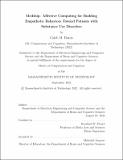Medship: Affective Computing for Building Empathetic Behaviors Toward Patients with Substance Use Disorders
Author(s)
Harris, Caleb M.
DownloadThesis PDF (4.145Mb)
Advisor
Picard, Rosalind W.
Terms of use
Metadata
Show full item recordAbstract
Opioid use is on the rise, with overdose deaths quadrupling since 1999. Consequently, so is substance use disorder (SUD), an illness caused by repeated use of substances such as alcohol or drugs that result in clinically significant impairment. Although physician interactions with patients with SUDs are dramatically increasing in frequency, the majority of medical training still fails to address the importance of building empathy and minimizing stigma in such clinical interactions. Furthermore, physicians receive only minimal instruction regarding the expression of empathy and its role in building rapport and eliciting positive responses from patients with SUDs. Such strategies not only improve the immediate clinical interaction by contributing to a warm, stigma-free environment, but also improve the long-term outcomes of the patient by driving them toward care instead of away from it. This thesis both identifies the affective features and expressions most attributed to positive clinical perception, from the perspective of actual patients with SUDs, and introduces Medship, a web-application-based tool embedded with affective computing models to provide real-time affective training for medical school students and physicians in simulated clinical interactions with patients with SUDs.
Date issued
2022-09Department
Massachusetts Institute of Technology. Department of Electrical Engineering and Computer SciencePublisher
Massachusetts Institute of Technology